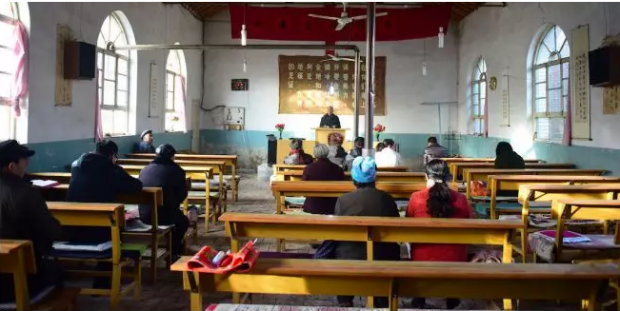This year, I've been told that three middle-aged male church workers have stepped down from key ministry positions in rural churches. Alarmingly, several others are teetering on the verge of resignation. One female volunteer, a certified preacher, submitted her resignation over a month ago, and the matter remains unresolved.
Historically, rural churches had been concerned with retaining young members. Today, however, even middle-aged staff, the church's backbone, are departing in significant numbers. This emerging crisis of "talent depletion" warrants serious attention. Some argue, "Others in the same circumstances remain, so the issue must lie with the individual rather than the environment." Yet such one-sided reasoning, which overlooks the broader challenges, has contributed to staff attrition. When economic pressures, dysfunctional environments, isolation, and uncertainty about the future converge, even the most devoted individuals can become disheartened. The issue of staff loss in rural churches calls for careful reflection.
Aspirations to Serve Strain Under the Pressures of Reality
While ministry is a spiritual calling, church workers do not operate in isolation from everyday life. Practical pressures are often the first challenge they face. In some rural churches, however, the notion that "money is a taboo" is deeply entrenched, and the value of workers' labor is frequently overlooked. Even reasonable requests for compensation are sometimes deemed "unspiritual."
One co-worker, suffering from severe kidney disease and registered for transplants at multiple hospitals, traveled daily to the city during a critical period of church renovations, costing significant time and expenses. The church provided no compensation, and some co-workers attacked him in collusion. Such physical, mental, and financial burdens became unsustainable, prompting his resignation this year. Another senior co-worker, who had long received a church salary, concealed this fact even from his most trusted peers. Later, he publicized that someone he considered "unworthy" was salaried, accusing one of "serving for money," which led believers to disparage paid preachers and further intensified the difficulties faced by younger co-workers.
When ministry can no longer meet basic living needs, when the right to fair compensation is misrepresented, and when the salary system is opaque and biased, many co-workers are left with no choice but to say, "Serving is too difficult" or "I can't afford it." To further criticize them by claiming "the problem lies with them" is to disregard the very real challenges they face.
Struggles Against the Strains of a Dysfunctional Environment
A healthy church should be a fellowship of mutual love and support. Yet in some rural churches, internal dynamics are unhealthy, often giving rise to friction and fostering an atmosphere of suspicion and calculation.
Rural communities are not always "simple and honest," as some harbor prejudice and ill will born of ignorance. Rather than being appreciated, co-workers' efforts may be met with unwarranted scrutiny or attacks. Their commitment is not lacking, but daily challenges gradually wear their enthusiasm.
For example, a senior co-worker quietly received a salary, feeling at ease, while others who earned compensation for their labor were maliciously accused of "serving for money." Uninformed believers, seeing years of unpaid service, perceived this as unfair to church leaders and vented their frustrations on the salaried seminarians. Some senior staff even displayed hostility toward competent young and middle-aged co-workers, offering neither guidance nor support but instead imposing restrictions, undermining efforts, and marginalizing them. In such an environment, bonds of love are replaced by complex interpersonal dynamics, mutual exploitation, and hidden agendas.
This unhealthy environment, day after day and year after year, drives young and middle-aged co-workers to leave the church.
Isolation and Helplessness in Ministry Collaboration
Church ministry is meant to be a collaborative effort, yet in some rural churches, the reality of "one against many" has become commonplace, leaving co-workers isolated and powerless.
Some seek to advance the ministry proactively but find no willing partners, lacking energetic or capable colleagues. When an individual finally attempts something new, their efforts may be met with unwarranted skepticism or resistance. A simple "we've always done it this way" can easily stifle innovation. Co-workers are often left to "fight alone." Without support or encouragement, even diligent efforts go unrecognized and instead attract criticism and accusations. I once asked a brother who commutes between the city and surrounding towns about the significant travel expenses, noting that the church provides no subsidy, and why no co-workers were assigned to assist him. He replied helplessly, "There's simply no one available."
When ministry becomes a solitary struggle, and every step is fraught with difficulty, "not being able to endure" is an inevitable outcome. This is not a "personal problem" but a challenge rooted in the church's environment.
A Hopeless and Uncertain Future
Another key reason for the departure of co-workers from rural churches is the exhaustion caused by prolonged uncertainty. To attribute their leaving simply to a lack of faith is unfair. Their initial commitment was not intended as a retreat. However, they wished to serve and repay the Lord's grace. Yet the more they serve, the more their sense of self-worth diminishes, leaving them exhausted and discouraged.
On one hand, co-workers often lack essential pastoral care and opportunities for growth. With no attention to their spiritual well-being and nowhere to seek guidance or understanding, they endure chronic fatigue. On the other hand, rural churches are often insular and resistant to new ideas, undervaluing the contributions of young members while overlooking the mentoring and legacy role of middle-aged co-workers.
The inability of rural churches to retain staff cannot be blamed solely on "personal loyalty." It stems from the church's failure to provide the conditions necessary for staff to stay. Apostle Paul showed compassion and care for his co-workers, understanding the challenges of ministry. Ignoring these objective difficulties and labeling them as "personal issues" risks further loss.
To stem the loss of co-workers, churches must break free from rigid thinking, establish fair and transparent support systems, foster relationships rooted in mutual love and support, recognize the value of every co-worker, and provide space and hope for growth. Ultimately, the vitality of a church is not measured by its buildings but by the people willing to dedicate themselves. Retaining them is essential to securing the future of rural churches.
(Originally published by the Gospel Times, the article has been edited under permission, and the author is a pastor at a church in Jiangsu Province.)
- Edited by Katherine Guo and translated by Poppy Chan












